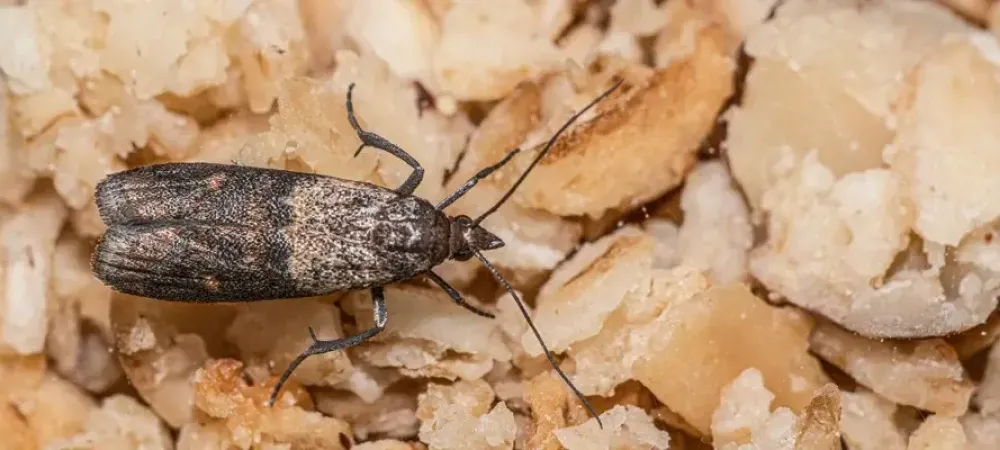Pantry Moths vs Clothes Moths: Identification and Prevention

Pantry moths infest dry foods like flour and cereals, while clothes moths chew through fabrics like wool and silk. Knowing the difference between pantry moths and clothes moths is the first step to stopping the damage. Here’s how to identify which moth you’re dealing with and what you can do to keep them out for good.
Table of Contents
- Pantry Moths vs Clothes Moths: What's the Difference?
- How to Get Rid of Moths in Your Home
- Prevention Tips to Keep Moths Away
- FAQs: Common Questions About Pantry and Clothes Moths
- When to Call a Pest Control Professional
Pantry Moths vs Clothes Moths: What's the Difference?
Pantry moths and clothes moths may look similar, but the damage they cause, and where they cause it, are completely different. Knowing which one you’re dealing with is the key to protecting your home and choosing the right solution. Here’s how to tell them apart:
Where You’ll Find Them
What They’re After
Signs of Damage
When They’re Most Active
If you’re unsure which moth you’re dealing with, check both food and fabric storage zones. The location of the problem and the type of damage will usually make it clear.
How to Get Rid of Moths in Your Home
If you’re already seeing moths flying around or finding signs of damage in your food or clothing, it’s time to act fast. Removing an active infestation requires a deep clean and targeted treatment to break their life cycle.
Follow these tips to get rid of moths in your home:
- Find the source of the problem immediately
- Throw away infested items and wash any salvageable clothes
- Wipe down and vacuum areas thoroughly to remove hidden eggs
- Set up moth and pheromone traps to catch remaining adults
- Call for professional help if the problem persists
For fast, effective moth removal you can count on, call a professional like Suburban Pest Control to get the job done right.
Prevention Tips to Keep Moths Away
The best way to deal with moths is to make sure they never get inside your home in the first place. Simple habits and smart storage practices can stop pantry moths and clothes moths from finding food or nesting spots. Here’s how to stay one step ahead:
- Store dry goods like flour, rice, and cereal in airtight glass or plastic containers.
- Regularly clean pantry shelves and vacuum up crumbs to avoid attracting pantry moths.
- Keep off-season clothing in sealed garment bags or plastic storage bins.
- Avoid letting clothes sit undisturbed for long periods. Shake them out, wash, or air them every few months.
- Use cedar blocks, lavender sachets, or natural repellents in closets for an added layer of protection.
- Install pantry moth traps and clothes moth traps as an early warning system in high-risk areas.
By keeping your home clean and organized, you’ll make it much harder for moths to settle in and cause damage.
FAQ: Common Questions About Pantry and Clothes Moths
Q: What causes moth infestations?
A: Pantry moths come from infested dry goods, while clothes moths are drawn to stored natural fibers in humid, undisturbed spaces.
Q: Do moths only infest dirty homes?
A: No, moths can show up anywhere, even in spotless homes, if they’re brought in on food or clothing.
Q: Can pantry moths ruin sealed food?
A: Yes, if food is in paper or cardboard packaging. They can chew through flimsy materials to get inside.
Q: Are clothes moths dangerous?
A: They don’t bite or sting, but they can cause serious clothes moth damage to valuable garments and textiles.
Q: How long does it take to eliminate moths?
A: With professional help, you can stop an infestation in weeks, but preventive measures are key to keeping them away long-term.
When to Call a Pest Control Professional
If you’ve tried cleaning, storing items properly, and even using moth traps but the problem keeps coming back, it’s time to bring in the experts. Pantry moths and clothes moths can be stubborn pests, and their eggs are often hidden in places you can’t see or reach. A professional can identify the source of the infestation, apply targeted treatments, and ensure your home is fully protected from future moth damage.
At Suburban Pest Control, we provide professional moth removal services so you don’t have to deal with the stress or frustration of repeated infestations. Our team knows where these pests hide and how to eliminate them for good. Contact us today to schedule your assessment and get a free quote.
